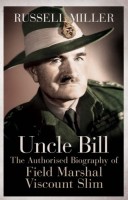Uncle Bill, the problems with “official” biographies and WW2 Burma
Posted: January 2nd, 2014 | 1 Comment »Though the publishers loudly trumpet it – I’d argue that “written with the full co-operation of the Slim family” is a worry rather than an endorsement. There is a problem with biography, or writing about anyone who has ancestors still knocking about (believe me, I should know!) – they tend to see their ancestors differently to the historian, the biographer or the story teller. Consequently they get very defensive and irate if you deviate from their family-agreed script (again, believe me, I should know!). This is why “official biography” is invariably boring and rote compared to the “unofficial” – the “official” biographer always has (either metaphorically or actually) a concerned and censoring descendent looking over their shoulder as they write. A biogapher must be able to research and interpret a person without fear or favour….Yes, you get access to all sorts of things; yes, you avoid treading on any toes and ending up in feuds with unhappy family members (I know, I know) who think anything less than sainthood for their esteemed ancestor is treachery, but you don’t inevitably capture the subject….
That’s the problem with this new biography of Field Marshal Viscount Slim, Uncle Bill – it’s largely a piece of fluffery to big up the man and so ensure co-operation from the family – it’s official, approved and we get all the minor charitable acts and the sort of things families like to boast about but not so much of the man himself with all the messy conundrums Slim, and the rest of us, are all made up of. Still, for those characters that are not being “officially” bio-ed here things get more interesting – Stilwell and his hatred of the Brits, the vainglorious Wingate, the problematic Chinese of course and Chiang Kai-shek’s failure to commit in Burma. Worth a read, but with the same pinch of salt you take tales of your marvellous old Uncle Stan from your loving old Aunt Agatha…
In 2011 the National Army Museum conducted a poll to decide who merited the title of ‘Britain’s Greatest General’. In the end two men shared the honour. One, predictably, was the Duke of Wellington. The other was Bill Slim. Had he been alive, Slim would have been surprised, for he was the most modest of men – a rare quality among generals. Of all the plaudits heaped on him during his life, the one he valued most was the epithet by which he was affectionately known to the troops: ‘Uncle Bill’.
Born in Bristol in 1891, the son of a small-time businessman, he was commissioned as a temporary Second Lieutenant on the outbreak of the First World War. Seriously wounded twice, in Gallipoli and Mesopotamia, he was awarded the Military Cross in 1918. Between the wars he served in the Indian Army with the Gurkhas and began writing short stories to supplement his income.
Promotion came rapidly with the Second World War, and in March 1942 he was sent to Burma to take command of the First Burma Corps, then in full flight from the advancing Japanese. Through the force of his leadership, Slim turned disorderly panic into a controlled military withdrawal across the border into India. Two years later, having raised and trained the largest army ever assembled by Britain, Slim returned to drive the enemy out of Burma and shatter the myth of Japanese invincibility which had hamstrung Allied operations in the East for so long. Probably the most respected and loved military leader since the Duke of Marlborough, he later became a popular and successful Governor-General of Australia in 1953, was raised to the peerage, and died in London in 1970.

The “problem” with living relatives is that they know when authors lie, bullshit, fabricate, and misquote them.